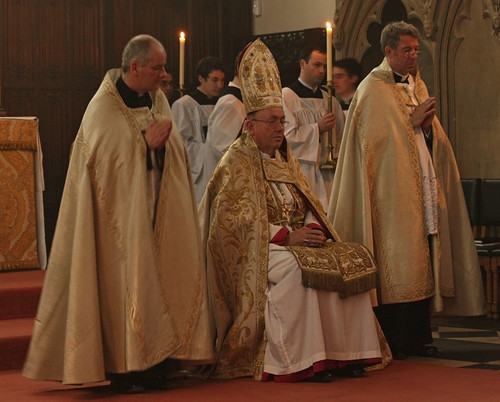I assisted at First Vespers and Benediction for the Feast of St Chad yesterday evening with the Oratorian Community in Manchester (one of five coped ministers assisting!) As usual the Community there accomplished the ars celebranda with their usual understated panache - managing elaborate ritual with a noble simplicity and no-nonsense style. The church has an excellent acoustic, so the chant and polyphony sounded very well indeed from the accomplished singers who assist there. I didn't really have very much to do, so it was rather pleasant to soak up the atmosphere of prayer and reverence.
I didn't get any photographs on the night, so those shown here were taken at other times. The Community is in the process of restoring the church, which has been neglected over the years. I pray that the Good Lord will bring them the means to carry out this great work in an area where the presence of the beauty, love and hope of the Faith is so much needed.
It was lovely to hear the Prayer for England from the old manual of Prayers, which I often use myself:
O MERCIFUL God, let the glorious intercession of Thy saints assist us, particularly the most blessed Virgin Mary, Mother of Thy only-begotten Son, and Thy holy Apostles, Peter and Paul, to whose patronage we humbly recommend this country. Be mindful of our fathers, Eleutherius, Celestine, and Gregory, bishops of the Holy City; of Augustine, Columba, Aidan and Chad who delivered to us inviolate the faith of the Holy Roman Church. Remember our holy martyrs, who shed their blood for Christ: especially our first martyr, Saint Alban, and Thy most glorious bishop, Saint Thomas of Canterbury. Remember all those holy confessors; bishops, and kings, all those holy monks and hermits, all those holy virgins and widows, who made this once an island of saints, illustrious by their glorious merits and virtues. Let not their memory perish from before Thee, O Lord, but let their supplication enter daily into Thy sight; and do Thou, who didst so often spare Thy sinful people for the sake of Abraham, Isaac, and Jacob, now, also, moved by the prayers of our fathers, reigning with Thee, have mercy upon us, save Thy people, and bless Thy inheritance; and suffer not those souls to perish, which Thy Son hath redeemed with His own most Precious Blood, Who liveth and reigneth with Thee, world without end. Amen.
Let us pray.
O most loving Lord Jesus, Who, hanging on the Cross, didst commend us all in the person of Thy disciple John, to Thy most sweet Mother, that we might find in her our refuge, our solace, and our hope; look graciously upon our beloved country, and on those who are bereaved of so powerful a patronage; that, acknowledging once more the dignity of this holy Virgin, they may honour and venerate her with all affection of devotion, and own her as Queen and Mother. May her sweet name be lisped by the little ones, and linger on the lips of the aged and the dying; and may it be invoked by the afflicted, and hymned by the joyful; that this Star of the Sea being their protection and their guide, all may come to the harbour of eternal salvation. Who livest and reignest, world without end. Amen.












.jpg)












